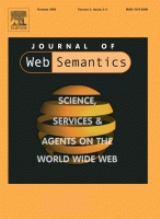
Journal of Web Semantics
Encyclopedia
The Journal of Web Semantics is an interdisciplinary
peer-reviewed
scientific journal
published by Elsevier
. It covers knowledge technologies, ontology
, software agent
s, databases and the semantic grid
, information retrieval, human language technology, data mining
, and semantic web
development. The journal is abstracted and indexed by Scopus
and the Science Citation Index
. According to the 2009 Journal Citation Reports
, it has a 2009 impact factor
of 3.412, ranking it fifth among the 116 journals in the category "Computer Science, Information Systems" and fifth among the 102 in the category "Computer Science, Artificial Intelligence".
Interdisciplinarity
Interdisciplinarity involves the combining of two or more academic fields into one single discipline. An interdisciplinary field crosses traditional boundaries between academic disciplines or schools of thought, as new needs and professions have emerged....
peer-reviewed
Peer review
Peer review is a process of self-regulation by a profession or a process of evaluation involving qualified individuals within the relevant field. Peer review methods are employed to maintain standards, improve performance and provide credibility...
scientific journal
Scientific journal
In academic publishing, a scientific journal is a periodical publication intended to further the progress of science, usually by reporting new research. There are thousands of scientific journals in publication, and many more have been published at various points in the past...
published by Elsevier
Elsevier
Elsevier is a publishing company which publishes medical and scientific literature. It is a part of the Reed Elsevier group. Based in Amsterdam, the company has operations in the United Kingdom, USA and elsewhere....
. It covers knowledge technologies, ontology
Ontology
Ontology is the philosophical study of the nature of being, existence or reality as such, as well as the basic categories of being and their relations...
, software agent
Software agent
In computer science, a software agent is a piece of software that acts for a user or other program in a relationship of agency, which derives from the Latin agere : an agreement to act on one's behalf...
s, databases and the semantic grid
Semantic Grid
The Semantic Grid refers to an approach to Grid computing in which information, computing resources and services are described using the semantic data model. In this model the data and metadata are expressed through facts . Therefore it becomes directly understandable for humans...
, information retrieval, human language technology, data mining
Data mining
Data mining , a relatively young and interdisciplinary field of computer science is the process of discovering new patterns from large data sets involving methods at the intersection of artificial intelligence, machine learning, statistics and database systems...
, and semantic web
Semantic Web
The Semantic Web is a collaborative movement led by the World Wide Web Consortium that promotes common formats for data on the World Wide Web. By encouraging the inclusion of semantic content in web pages, the Semantic Web aims at converting the current web of unstructured documents into a "web of...
development. The journal is abstracted and indexed by Scopus
Scopus
Scopus, officially named SciVerse Scopus, is a bibliographic database containing abstracts and citations for academic journal articles. It covers nearly 18,000 titles from over 5,000 international publishers, including coverage of 16,500 peer-reviewed journals in the scientific, technical, medical,...
and the Science Citation Index
Science Citation Index
The Science Citation Index is a citation index originally produced by the Institute for Scientific Information and created by Eugene Garfield in 1960, which is now owned by Thomson Reuters. The larger version covers more than 6,500 notable and significant journals, across 150 disciplines, from ...
. According to the 2009 Journal Citation Reports
Journal Citation Reports
Journal Citation Reports is an annual publication by the Healthcare & Science division of Thomson Reuters. It has been integrated with the Web of Knowledge, by Thomson Reuters, and is accessed from the Web of Science to JCR Web. It provides information about academic journals in the sciences and...
, it has a 2009 impact factor
Impact factor
The impact factor, often abbreviated IF, is a measure reflecting the average number of citations to articles published in science and social science journals. It is frequently used as a proxy for the relative importance of a journal within its field, with journals with higher impact factors deemed...
of 3.412, ranking it fifth among the 116 journals in the category "Computer Science, Information Systems" and fifth among the 102 in the category "Computer Science, Artificial Intelligence".

